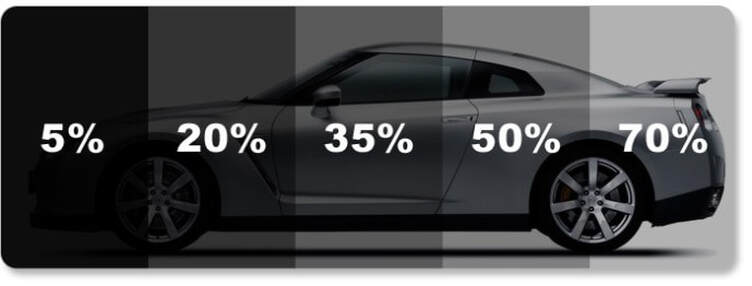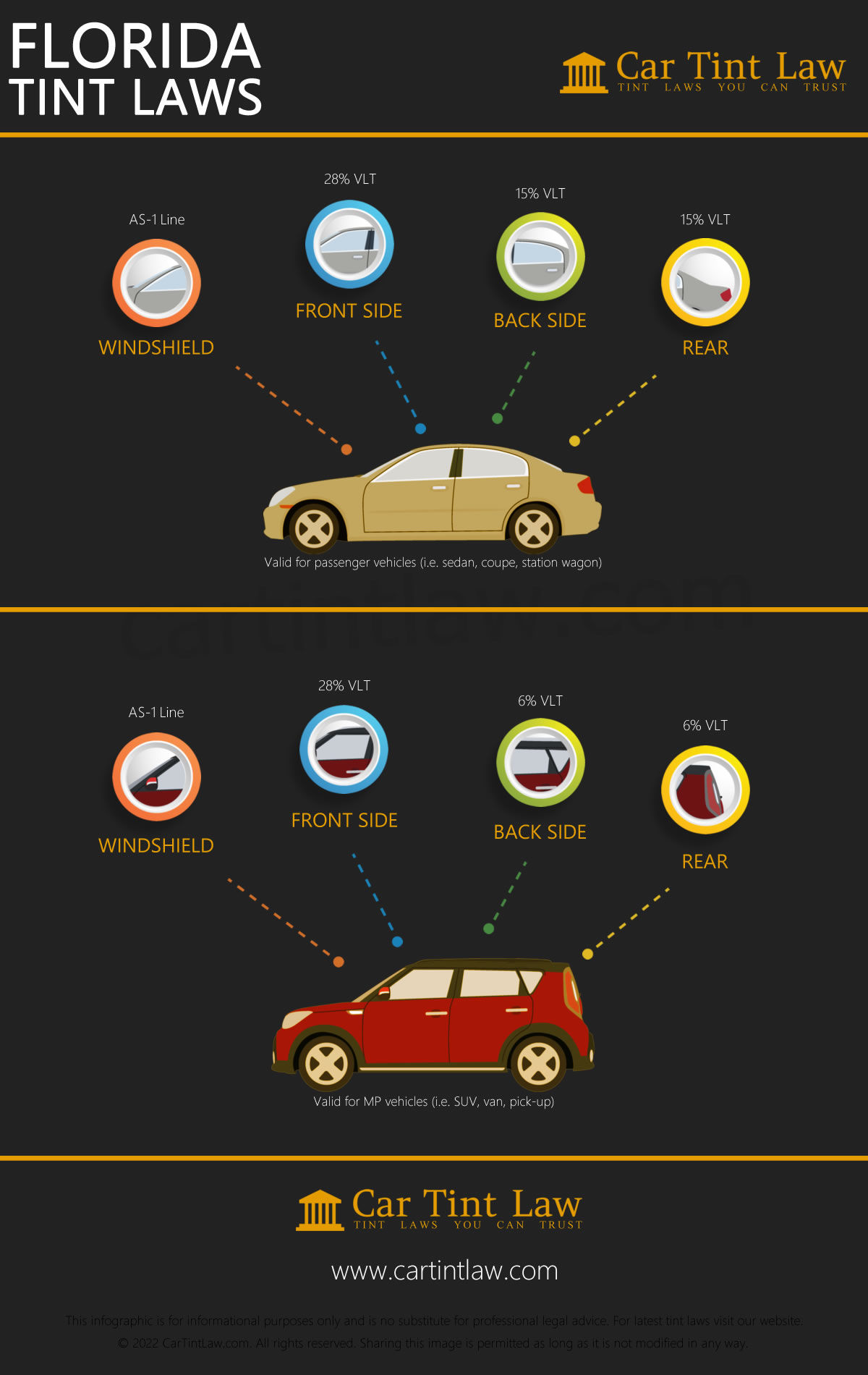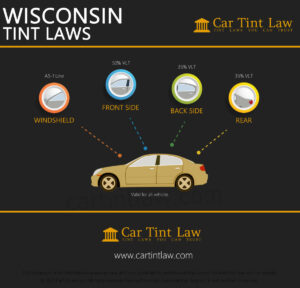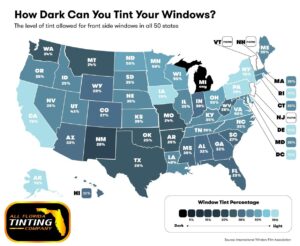As an Amazon Associate, I earn from qualifying purchases
Understanding Florida’s window tint laws is crucial for car owners. These laws ensure safety and compliance while driving.
Window tinting can improve comfort and privacy for drivers. But, Florida has specific regulations on how dark or reflective car tints can be. Ignoring these rules can lead to fines or penalties. Knowing the legal limits helps avoid trouble and ensures your car meets state standards.
This guide will explain the key points of Florida’s window tint laws. It will help you stay informed and drive safely within the legal boundaries. Let’s dive in and explore the details of these important regulations.
Introduction To Florida Tint Laws
Driving in Florida means dealing with a lot of sunlight. This makes car window tinting popular. But Florida has strict laws about how much tint you can use. These laws exist to keep everyone safe. They also make sure your car stays legal. Understanding these laws is important for every driver in Florida.
Importance Of Compliance
Following Florida’s tint laws helps you avoid trouble. It ensures your car meets safety standards. Legal tints help law enforcement see inside your car. This can prevent misunderstandings during traffic stops. It also keeps you safe on the road. Too dark tints can hinder your vision. This is especially true at night. Staying within legal limits keeps you and others safe.
Consequences Of Violations
Breaking tint laws in Florida can lead to fines. You might get a ticket. The fine can be costly. You may need to remove the illegal tint. This means extra expense. Repeated violations can lead to more severe penalties. It can affect your driving record. Avoid these issues by following the law. Keep your car’s tint within the legal limits.

Credit: www.windowtintinglargo.com
Legal Tint Percentages
Florida has specific laws for car window tints. These laws help ensure safety on the roads. Knowing the legal tint percentages is crucial for car owners in Florida. It helps avoid penalties and ensures the safety of all road users. Let’s explore the legal tint percentages for different car windows in Florida.
Front Side Windows
The front side windows in Florida must let in more than 28% of light. This means the tint can block up to 72% of light. This rule helps maintain clear visibility for drivers and law enforcement officers. Violating this can result in fines.
Back Side Windows
For backside windows, Florida law allows a tint that blocks up to 85% of light. This means these windows must let in at least 15% of light. This provides more privacy for passengers and helps keep the interior cooler.
Rear Window
The rear window can have a darker tint, similar to the back side windows. It must allow at least 15% of light to pass through. This helps keep the car’s interior cool and adds privacy. Ensure your rear window tint meets this requirement to avoid fines.
Windshield Guidelines
The windshield has stricter tinting rules. Only the top section of the windshield can be tinted. This strip cannot extend more than the AS-1 line or five inches from the top. The rest of the windshield must remain clear. This ensures clear visibility for the driver.
Exceptions And Exemptions
Understanding Florida window car tint laws involves knowing the exceptions and exemptions. These rules ensure safety while accommodating special needs. Certain exemptions allow deviations from standard tint regulations.
Medical Exemptions
Some individuals may require darker tints for medical reasons. These medical exemptions cater to people with conditions sensitive to sunlight. For example, those with lupus or other skin conditions. To qualify, a person must obtain a physician’s certification. The certification must detail the need for the exemption. This document should be kept in the vehicle at all times.
Vehicle Type Considerations
Different vehicle types have varied tint regulations. For instance, multi-purpose vehicles like vans and SUVs may have darker tints on rear windows. This is more lenient compared to sedans. Commercial vehicles often have different rules, too. They may require specific tints for safety and visibility. Always check the specific regulations for your vehicle type.
Penalties For Non-compliance
Non-compliance with Florida’s car window tint laws can lead to serious penalties. These penalties ensure drivers follow the regulations to maintain safety on the roads. Understanding these penalties can help avoid unnecessary trouble.
Fines And Tickets
Drivers with illegal window tint can face fines. The fines can range up to $100 for a first offense. Repeat offenders may pay even higher fines. Law enforcement officers have the authority to issue tickets on the spot. These fines can quickly add up, making it costly to ignore the law.
Removal And Re-inspection
In addition to fines, drivers may need to remove the illegal tint. This removal must occur within a specified time frame. After removal, the vehicle must pass a re-inspection. Failing to do so can result in further penalties. This ensures that drivers comply with the legal requirements.
Choosing The Right Tint
Choosing the right tint for your car windows involves several important steps. It is crucial to understand Florida’s window tint laws. This ensures compliance and avoids fines. The right tint can enhance your car’s appearance. It also provides better privacy and protection from harmful UV rays. Below are key aspects to consider.
Certified Tint Products
Certified tint products meet safety and legal standards. These products ensure that your tint complies with Florida laws. Always check for certification before purchasing. Certified products guarantee quality and durability. They also offer better protection against UV rays.
Professional Installation
Professional installation is essential for quality tinting. Experts have the right tools and skills. They ensure a smooth and even application. Poor installation can lead to bubbles and peeling. This affects the appearance and effectiveness of the tint. Always choose a reputable installer for the best results.

Credit: www.cartintlaw.com
Maintaining Your Tint
Maintaining your car’s window tint is vital for its longevity and appearance. Proper care can help you avoid fines and ensure a clear view.
Care And Cleaning
To keep your tint looking fresh, follow these simple cleaning tips:
- Use a mild soap mixed with water.
- Avoid ammonia-based cleaners, which can damage the tint.
- Apply the cleaner using a soft cloth or sponge.
- Do not use abrasive materials that can scratch the surface.
Cleaning your windows regularly helps remove dirt and dust. This keeps your tint clear and effective.
Longevity Tips
Want your tint to last longer? Here are some useful tips:
- Park in the shade: Sun exposure can fade your tint over time.
- Use sunshades: These help protect your tint from direct sunlight.
- Be gentle with your windows: Avoid rolling them up and down frequently.
- Check for bubbles and peeling: Fix issues early to prevent further damage.
Taking these steps ensures your tint remains in top condition for years.
Resources And Assistance
Understanding Florida’s window car tint laws can be challenging. But, there are many resources and assistance available to help you. These resources can guide you through the legal requirements and ensure you comply with state regulations.
Where To Get Help
Local tint shops are a great place to start. They often have up-to-date information on state laws. They can help you choose the right tint for your vehicle. Your local DMV office is another good resource. They can provide detailed information on legal tint limits. You can also contact a legal advisor if you need more specific guidance.
Useful Websites And Contacts
Several websites offer valuable information about window tint laws. The Florida Department of Highway Safety and Motor Vehicles (FLHSMV) website provides comprehensive details. Visit their site at FLHSMV.gov for more information.
Another helpful site is the International Window Film Association (IWFA). They offer resources and support for window tinting issues. You can access their website at IWFA.com.
For more personalized assistance, contact local tint installers. They can answer your questions and ensure your tint meets legal standards. Many installers provide free consultations and estimates.

Credit: thetintlaws.com
Frequently Asked Questions
What Is The Legal Tint Limit In Florida?
In Florida, the legal tint limit for the front side windows is 28%. For the rear side windows and the back window, the limit is 15%.
Are There Medical Exemptions For Window Tinting In Florida?
Yes, Florida allows medical exemptions for window tinting. Individuals with certain medical conditions can apply for a medical exemption permit for darker tints.
Can You Tint Your Windshield In Florida?
In Florida, tinting the windshield is permitted. However, only the top portion of the windshield, above the AS-1 line, can be tinted.
What Are The Penalties For Illegal Window Tint In Florida?
Penalties for illegal window tinting in Florida include fines. Vehicle owners may also be required to remove the illegal tint.
Conclusion
Understanding Florida window car tint laws ensures you stay compliant. Following these rules keeps you safe and avoids fines. Always check for updates on regulations. Legal tinting improves comfort and privacy. It also protects your vehicle’s interior. Stay informed and enjoy a safer driving experience.
Remember, adherence to the law is key. Drive smart, drive safe.
As an Amazon Associate, I earn from qualifying purchases


